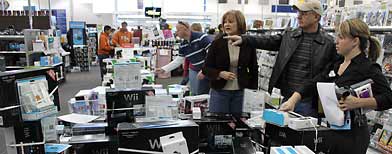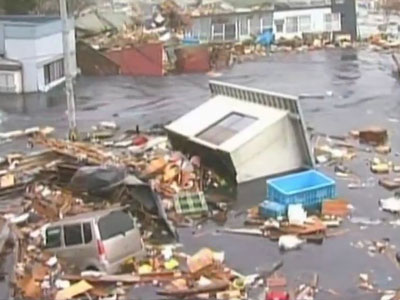

With a horrific environmental and humanitarian disaster unfolding in Japan, it seems petty to discuss financial matters. Still, Japan is home to the world's third-largest economy and, at over $200 billion annually, is America's fourth-largest trading partner.
For American consumers, the most direct impact from Japan is being felt in oil prices, which have fallen sharply since Friday, when the quake hit. Crude futures briefly fell below $100 per barrel early Monday, before rebounding amid reports of violent protests in Bahrain, which borders Saudi Arabia.
Japan is the world's third-largest importer of oil, behind only the U.S. and China. With economic activity ground to a halt, its power-production crippled and the nation's major oil refineries shut down or damaged, Japan's demand for oil is expected to fall sharply -- at least in the near term.
Crude prices have now fallen 6% in the past five trading days and hit a two-week low Monday. But don't expect any relief at the pump, where the average price for a gallon of regular was $3.54 on Friday.
As everybody knows, gas prices don't track oil prices nearly as closely when crude is falling versus when it's rising. Furthermore, even if Japan's demand for crude falls, its need for gasoline and other "distilled" products is expected to rise because of the damage done to the nation's refineries. "That is going to drive up the market price for everything from diesel and gasoline to jet fuel," James DiGeorgia, editor of the Gold & Energy Advisor, tells The LA Times.
Furthermore, the drop in oil prices is expected to be short-lived unless Japan's disaster tips the world economy back into recession, an unlikely scenario barring a total nuclear meltdown. Japan will need plenty of energy for its rebuilding effort, and if the accident at Fukushima prompts a backlash against nuclear power, in Japan or elsewhere, that will only mean more demand for "conventional" sources, most notably oil. (See: Japan's Nuclear Meltdown Has Congress Questioning Nuclear Energy)
Made in Japan, Costs More Here
The massive earthquake and resulting tsunami struck the nation's industrial heartland and triggered the worst nuclear accident since Chernobyl -- and one with a highly uncertain outcome. The areas affected by the disaster, including Tokyo and eight prefectures, account for 40% of Japan's GDP.
Here's a rundown of other consumer areas affected by the disaster:
Autos: Expect the price of Japanese cars to rise in the coming months after Toyota, Honda and Nissan Motors each closed plants hit by the earthquake, tsunami and resulting power outages. Japanese automakers have manufacturing plants all over the world, including here in the U.S., so scarcity should not be a problem -- save for certain models such as the Toyota Prius and Honda Fit, which are literally and figuratively "made in Japan."
Citing IHS Global Insight, USA Today reports shipments of models such as the Toyota Yaris; Scion xD and xB, Honda CR-V, Accord, and Fit; and Acura TSX and RL, are likely to be at risk if the production snags last long. In addition, most Lexus vehicles sold in America are made in Japan, although the firm has a plant in Ontario, Canada.
Consumer Electronics: The home of Sony, Toshiba and Hitachi, Japan produces some of the world's best consumer gadgets and the components that power them. Prices of memory chips and liquid crystal displays have surged since the quake, The WSJ reports, amid fears of shortages and supply disruption.
There have been no reports of shortages yet, but Sony alone has halted production at six factories in northern Japan. And I don't want to incite concern among Apple's rabid supporters, but it's worth noting that Toshiba supplies NAND flash memory for use in Apple's hugely popular iPhones and iPads.
Research firm IHS iSuppli is predicting "some disruption in semiconductor supplies from Japan during the next two weeks," and it's unlikely U.S. consumers will see any big change in electronic prices before then. But any prolonged snags in the complex production supply chain will almost certainly be felt by Easter, so expect fewer and smaller discounts from electronics retailers this spring.
Hello Kitty, Goodbye Mochi: In response to the disaster, the Bank of Japan has flooded its economy with money, while Japanese corporations and ex-pats have repatriated assets back to their home country. That has resulted in strength in the yen vs. the dollar, already under pressure because of the Fed's easy money and Uncle Sam's huge deficits. Further and sustained weakness in the dollar will drive up the price Americans pay for all Japanese imports, everything from Sony TVs to Toyotas to Mochi ice cream balls and Sanrio's Hello Kitty paraphernalia.
The Worst Crisis
The silver lining in Japan's disaster is that the quake and resulting tsunami struck in the northeast region of the country, which is not a heavily populated area. The loss of life, while certain to rise from the current official tally of 1,500, was further mitigated by Japan's sophisticated earthquake-resistant buildings, as well as nationwide preparedness drills.
Still, "the earthquake, tsunami and the situation at our nuclear reactors makes up the worst crisis in the 65 years since the war," as Prime Minister Naoto Kan said.
Financial markets and the global economy will recover sooner or later, but many Japanese communities and families will never be the same again. If there's any good that can come from this, it's only if such a disaster helps the rest of us come to appreciate the blessings we have and remember what's "really" important.
For those interested in sending help to Japan, the U.S. Agency for International Development refers visitors to InterAction.org's list of "appropriate disaster relief."
Aaron Task is the host of Tech Ticker. You can follow him on Twitter at @atask or email him at altask@yahoo.com
http://finance.yahoo.com/tech-ticker/from-gas-to-gadgets-japan%27s-disaster-means-higher-prices-536027.html
No comments:
Post a Comment